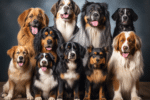Comprehensive Guide To Choosing The Perfect Dog Breed

Choosing The Right Dog Breed: Choosing the right dog breed requires an understanding of their unique characteristics, including size, temperament, and special qualities that make them popular choices among dog lovers.
In this comprehensive guide, we will explore the world of dog breeds, highlighting their diverse characteristics and providing valuable insights for potential dog owners. With over 340 recognized breeds worldwide, each with its own physical traits, temperament, and movement, there is a perfect breed out there for everyone.
Dog breeding dates back to prehistoric times. After that, we will explore Labradors, German Shepherds, Poodles, Bulldogs, and Beagles, highlighting their particular traits and why they are so popular.
We will also discuss tiny, large, hypoallergenic, clever, and family-friendly dog breeds. Chihuahuas, Pomeranians, and French Bulldogs are cute, but Great Danes and Rottweilers are strong and protective.
We’ll explore hypoallergenic dog breeds including Poodles, Bichon Frises, and Maltese, which shed little and are less allergenic. We will look at Border Collies, German Shepherds, and Poodles for intelligent, trainable pets.
The final point is to evaluate your lifestyle and needs when picking a dog breed. A happy relationship with your pet depends on your activity level, living situation, and time commitment.
Our advice emphasizes proper canine care, including regular exercise, a healthy food, grooming, socialization, and veterinary checkups. You can keep your dog healthy and happy by taking care of them.
So join us as we explore the fascinating world of dog breeds and their unique traits. With this guide, you’ll be ready to pick the right pet for your lifestyle and household.
An Overview of Dog Breeds

Dog breeding dates back to prehistoric times, resulting in a wide variety of breeds with distinct physical and behavioral traits. With over 340 recognized breeds worldwide, each dog breed has specific characteristics that make them unique from one another.
From the friendly and energetic Labradors to the intelligent and versatile German Shepherds, dog breeds offer a wide range of traits to suit different preferences. Poodles, known for their elegance and hypoallergenic qualities, make excellent companions for those with allergies. Bulldogs, on the other hand, are known for their resilience and make loyal and devoted pets.
It’s also important to consider factors such as size, activity level, and compatibility with your lifestyle when choosing a dog breed. For example, small dog breeds like Chihuahuas and Pomeranians are adaptable to different living spaces and bring a lively and energetic personality to their owners. Conversely, large dog breeds such as Great Danes and Golden Retrievers are known for their size, strength, and protective nature.
Table: Popular Dog Breeds
| Breed | Characteristics |
|---|---|
| Labrador Retriever | Friendly, energetic, versatile |
| German Shepherd | Intelligent, versatile, working dog |
| Poodle | Elegant, hypoallergenic |
| Bulldog | Resilient, loyal, great companion |
| Beagle | Friendly, strong sense of smell |
Popular Dog Breeds
Popular dog breeds like Labradors, German Shepherds, Poodles, and Bulldogs possess distinct characteristics that have made them well-loved by dog enthusiasts worldwide. Labradors are known for their friendly and outgoing nature, making them excellent family pets. They are also highly energetic and require regular exercise to keep them happy and healthy. German Shepherds, on the other hand, are intelligent and versatile working dogs. They are often used in various roles such as search and rescue, police and military work, and as service animals.
Poodles are elegant and hypoallergenic, making them a popular choice for people with allergies. They come in three sizes: standard, miniature, and toy, and are highly trainable and adaptable. Bulldogs, despite their tough exterior, are actually very affectionate and make loyal companions. They are known for their calm and gentle nature, making them great for families with children.
Each of these popular dog breeds has their own unique set of characteristics, but what they all have in common is their ability to bring joy and companionship to their owners. Whether you prefer an active and energetic breed or a calm and laid-back companion, there is a popular dog breed out there that will suit your lifestyle and preferences.
| Breed | Characteristics |
|---|---|
| Labrador Retriever | Friendly, energetic, excellent family pets |
| German Shepherd | Intelligent, versatile, working dogs |
| Poodle | Elegant, hypoallergenic, highly trainable |
| Bulldog | Affectionate, calm, gentle |
Small Dog Breeds
Small dog breeds like Chihuahuas, Pomeranians, and French Bulldogs offer unique characteristics that make them ideal companions for those seeking a smaller sized dog. Despite their small stature, these breeds are known for their big personalities and are often full of energy and charm.
Chihuahuas are known for their loyalty and feisty nature. They may be small in size, but they have a big presence and are often fearless. Pomeranians, on the other hand, are known for their fluffy coats and friendly personalities. They are often social butterflies and love being the center of attention.
French Bulldogs, with their signature bat ears and affectionate nature, have gained popularity in recent years. They are great companions for families and individuals alike, and they get along well with other pets. Despite their small size, they are sturdy and can adapt well to different living environments.
| Breed | Characteristics |
|---|---|
| Chihuahua | Loyal, fearless, small in size |
| Pomeranian | Fluffy coat, friendly, social |
| French Bulldog | Affectionate, adaptable, good with other pets |
When considering a small dog breed, it’s important to note that their size does not limit their capabilities. Small dogs can excel in activities such as obedience training, agility, and even therapy work. They are often well-suited to apartment living and can provide endless love and companionship to their owners.
Large Dog Breeds
Large dog breeds like Great Danes, Golden Retrievers, and Rottweilers possess unique characteristics that make them suitable for families seeking a bigger and more robust companion. These breeds are known for their impressive size, strength, and protective nature. Their loyal and gentle temperament makes them great family pets.
Great Danes are one of the largest dog breeds, known for their majestic appearance and friendly disposition. Despite their size, they are generally friendly and good-natured, making them excellent companions for families with children. Golden Retrievers, on the other hand, are known for their intelligence, loyalty, and friendly nature. They are often used as therapy dogs due to their gentle and patient demeanor. Rottweilers, with their muscular build and protective instincts, make excellent guard dogs and are known for their loyalty and devotion to their family.
Characteristics of Large Dog Breeds
Large dog breeds typically require ample space to move around and thrive, making them more suitable for households with a spacious backyard or access to outdoor areas. Their size and strength also mean that they require regular exercise to maintain their physical and mental well-being. Daily walks, playtime, and interactive activities are essential for keeping these breeds happy and healthy.
| Breed | Size | Temperament | Exercise Needs |
|---|---|---|---|
| Great Dane | Extra Large | Friendly, Gentle | Moderate |
| Golden Retriever | Large | Intelligent, Loyal | High |
| Rottweiler | Large | Loyal, Protective | Moderate |
When considering a large dog breed, it’s important to remember that they may require more maintenance and care than smaller dogs. Grooming needs, such as regular brushing and grooming sessions, can vary among breeds, but overall, these breeds may shed more and require more attention to keep their coats healthy. Additionally, their food and medical expenses may be higher due to their larger size.
In conclusion, large dog breeds bring strength, loyalty, and protection to families seeking a bigger and more robust companion. From the gentle giant Great Dane to the intelligent and loving Golden Retriever, and the fiercely loyal Rottweiler, these breeds offer unique characteristics that make them excellent choices for families looking for a canine companion that can provide both love and security.
Hypoallergenic Dog Breeds
Hypoallergenic dog breeds like Poodles, Bichon Frises, and Maltese offer unique characteristics that make them suitable for individuals with allergies or sensitivities to dog dander. These breeds have hair instead of fur, which means they shed less and produce fewer allergens. Additionally, their coat types require regular grooming to prevent matting and maintain their hypoallergenic qualities.
Not only are hypoallergenic dog breeds great for people with allergies, but they also come in a variety of sizes and temperaments to suit different lifestyles. Poodles excel in intelligence and adaptability, while Bichon Frises are cheerful and affectionate family pets. Maltese dogs are gentle and playful, making them an ideal choice for apartment dwellers or those looking for a small-sized breed.
When considering a hypoallergenic dog breed, it’s important to keep in mind that individual allergies vary, and no dog breed is completely hypoallergenic. Some people may still experience allergic reactions despite choosing a hypoallergenic breed. Spend time with the breed to check for allergic reactions.
| Breed | Size | Temperament |
|---|---|---|
| Poodle | Toy, Miniature, Standard | Intelligent, Active, Affectionate |
| Bichon Frise | Small | Cheerful, Gentle, Playful |
| Maltese | Small | Gentle, Playful, Alert |
When considering a hypoallergenic dog breed, it’s important to weigh the pros and cons and choose a breed that aligns with your lifestyle, energy level, and overall preferences. Whether you’re looking for a small companion or an active and intelligent dog, hypoallergenic breeds offer a range of options to suit various households.
Intelligent Dog Breeds
Intelligent dog breeds like Border Collies, German Shepherds, and Poodles possess unique characteristics that make them highly trainable and intellectually engaging companions. People say that these dog types are smart and learn new things quickly. This makes them great for many activities, such as obedience training, agility, and even performance sports.
Border Collies pay close attention and do well at jobs that require them to solve complicated problems. A lot of people think they are the smartest dog breed. They have a remarkable ability to understand commands and can learn new tasks quickly. However, German Shepherds are known for being versatile. Workers use them in many areas, such as search and rescue, police work, and customer service.
Poodles, with their distinctive curly coats, are not only elegant but also incredibly intelligent. They are highly trainable and excel in obedience training and dog sports. There are standard, miniature, and toy poodles, as well as other sizes, so there are choices for people who want an intelligent dog in a smaller package.
The Characteristics of Intelligent Dog Breeds
Intelligent dog breeds share several key characteristics that make them stand out. They are highly trainable, eager to please, and possess excellent problem-solving skills. These breeds thrive on mental stimulation and require regular mental exercise to prevent boredom and potential behavior issues.
| Breed | Main Characteristics |
|---|---|
| Border Collie | Highly focused, excellent problem-solving skills, quick learners |
| German Shepherd | Versatile, adaptable, used in various working roles |
| Poodle | Highly trainable, elegant, available in different sizes |
When considering an intelligent dog breed, it’s important to remember that their intelligence comes with unique needs. Providing them with mental stimulation through interactive toys, puzzles, and training sessions will keep them happy and engaged. Regular exercise is also crucial to maintaining their overall well-being and preventing boredom-related behaviors.
If you’re looking for a companion that can keep up with your active lifestyle and challenge your intellect, an intelligent dog breed like a Border Collie, German Shepherd, or Poodle may be the perfect choice for you.
Family-Friendly Dog Breeds
Family-friendly dog breeds like Labrador Retrievers, Beagles, and Golden Retrievers possess unique characteristics that make them great companions for households with children. Labradors excel as friendly playmates for kids. Their high energy levels and enthusiasm for outdoor activities ensure they can keep up with active families.
Beagles are gentle, loving companions. They have a strong sense of smell and make great family pets due to their loyalty and adaptability. Beagles are also patient with children and enjoy engaging in playtime and exploration.
Golden Retrievers are among the most family-friendly breeds, valued for affection and patience with children. These intelligent and eager-to-please dogs excel in social settings and are typically gentle and tolerant, even with the youngest members of the family.
In conclusion, when choosing a family-friendly dog breed, Labrador Retrievers, Beagles, and Golden Retrievers are top choices due to their unique characteristics. Their friendly nature, patience, loyalty, and adaptability make them wonderful additions to households with children. Remember to consider factors such as size, energy level, and lifestyle when selecting the perfect companion for your family.
| Breed | Characteristics |
|---|---|
| Labrador Retriever | Friendly, outgoing, high energy, adaptable |
| Beagle | Gentle, loyal, patient, strong sense of smell |
| Golden Retriever | Loving, patient, intelligent, tolerant |
Considering Your Lifestyle and Needs
Choosing the right dog breed goes beyond their characteristics; it requires a thoughtful consideration of your lifestyle, living situation, and individual needs. Each breed has its own unique traits and energy levels, so finding a dog that aligns with your lifestyle is key to ensuring a harmonious relationship. Here are some factors to consider when selecting a dog breed:
- Activity Level: Are you an active person who enjoys long walks and outdoor activities? Or do you prefer a more laid-back lifestyle? Some breeds, like Border Collies and Retrievers, are highly energetic and require plenty of exercise, while others, like Bulldogs and Basset Hounds, are more content with shorter walks.
- Living Situation: Do you live in an apartment or a house with a large yard? Chihuahuas and French Bulldogs suit apartment living with their small size. On the other hand, breeds like Great Danes and Huskies need more space to roam and thrive in a larger home with a backyard.
- Family Dynamics:
- Time Commitment: Dogs require time and attention, including training, socialization, grooming, and regular veterinary care. Some breeds, like Border Collies and German Shepherds, are highly intelligent and need mental stimulation and training to prevent boredom. If you have limited time to devote to these activities, it may be best to choose a breed that requires less maintenance.
Bringing it all together
By considering your lifestyle and needs, you can select a dog breed that will be a perfect match for you. Remember, every dog is an individual, and these characteristics are generalizations. It’s essential to spend time with different breeds, talk to breeders, and seek advice from professionals to ensure you make an informed decision. Dogs bring joy and companionship to our lives, so take the time to find the right one that will be a loving addition to your family.
| Breed | Activity Level | Living Situation | Family Compatibility |
|---|---|---|---|
| Border Collie | High | Large yard | Kid-friendly |
| Bulldog | Low | Apartment | Good with other pets |
| Golden Retriever | High | House with a yard | Kid-friendly |
| Chihuahua | Low | Apartment | May not tolerate rough play |
The Importance of Proper Dog Care
Every dog requires regular exercise, a balanced food, grooming, socializing, and vet checkups for health and well-being.
Any dog breed needs exercise to maintain a healthy weight, strong muscles, and cerebral stimulation. For maximum health, match your dog’s breed, age, and energy levels with regular walks, interactive play, or more rigorous workouts.
Providing your dog with critical nutrients for maximum health requires a balanced diet. Your dog’s age, size, and dietary needs will decide the proper food and amount. Consult your vet. Nutritionally complete dog food increases immunity, growth, and weight.
Dogs need regular brushing to avoid tangles and maintain coat and skin health. Nail clipping, ear and teeth care vary by breed. Grooming helps detect skin illnesses and parasites as well as improve looks.
| Proper Dog Care Checklist |
|---|
| Provide regular exercise tailored to their needs |
| Feed a balanced and nutritious diet |
| Regularly groom their coat, nails, ears, and teeth |
| Ensure proper socialization and training |
| Schedule regular veterinary check-ups and vaccinations |
Raising a happy, well-rounded dog requires socialization. Exposing your pet to people, animals, and situations early on boosts confidence, decreases anxiety, and encourages good behavior. Training your dog helps them learn basic commands, comprehend boundaries, and bond with you.
Finally, regular vet visits are essential for diagnosing and preventing health issues. Your vet will vaccinate, examine, and answer your questions. Your pet will live longer and healthier with regular checkups that detect and treat health issues early.
Following these instructions and giving your dog the right care, attention, and love can ensure they enjoy a happy, healthy life as a valued family member.
Conclusion
Understanding the characteristics of different dog breeds is crucial in finding the perfect furry companion to suit your lifestyle and meet your specific needs. Dog breeding dates back to prehistoric times and has resulted in over 340 recognized breeds worldwide, each with their own distinct physical traits, temperaments, and movement patterns outlined in breed standards.
Labradors are friendly and energetic, while German Shepherds are smart working dogs. Poodles, on the other hand, are elegant and hypoallergenic, making them a popular choice for those with allergies, and Bulldogs are resilient and make great companions.
When considering a dog breed, it’s essential to take into account your lifestyle and needs. Active individuals may lean towards breeds like Beagles, known for their friendly nature and strong sense of smell, while those with limited living space might opt for small dog breeds like Chihuahuas or French Bulldogs, who are adaptable and energetic despite their compact size.
Regardless of the breed you choose, proper care is paramount. Regular exercise, a nutritious diet, grooming, socialization, and routine veterinary check-ups are essential to ensure the health and happiness of your furry friend. By considering the unique characteristics of different dog breeds and providing the appropriate care, you can create a fulfilling and lifelong bond with your canine companion.
FAQ
Q: Why is understanding dog breeds and their unique characteristics important?
A: Understanding dog breeds and their unique characteristics is important when choosing the right breed for you. Different breeds have different physical traits, temperament, and movement. By understanding these characteristics, you can find a breed that matches your lifestyle and needs.
Q: How many recognized dog breeds are there worldwide?
A: There are over 340 recognized dog breeds worldwide.
Q: What are some popular dog breeds and their unique characteristics?
A: Some popular dog breeds include Labradors, known for their friendliness and energy; German Shepherds, known for their intelligence and versatility as working dogs; Poodles, known for their elegance and hypoallergenic qualities; Bulldogs, known for their resilience and companionship; and Beagles, known for their friendliness and strong sense of smell.
Q: What are some characteristics of small dog breeds?
A: Small dog breeds are often compact in size, adaptable to different living spaces, and can have energetic personalities. Some popular small dog breeds include Chihuahuas, Pomeranians, and French Bulldogs.
Q: What are some characteristics of large dog breeds?
A: Large dog breeds are known for their size, strength, and often protective nature. Some popular large dog breeds include Great Danes, Golden Retrievers, and Rottweilers.
Q: Which dog breeds are hypoallergenic?
A: Some hypoallergenic dog breeds include Poodles, Bichon Frises, and Maltese. These breeds are known for minimal shedding and reduced allergenic qualities.
Q: Which dog breeds are considered intelligent?
A: Some intelligent dog breeds include Border Collies, German Shepherds, and Poodles. These breeds are known for their high trainability, problem-solving abilities, and quick learning.
Q: What are some family-friendly dog breeds?
A: Some family-friendly dog breeds include Labrador Retrievers, Beagles, and Golden Retrievers. These breeds are known for their sociability, patience, and compatibility with children.
Q: What should I consider when choosing a dog breed?
A: When choosing a dog breed, it’s important to consider factors such as your activity level, living situation, and the time commitment required to properly care for the breed.
Q: How can I provide proper care for my dog?
A: Proper care for your dog includes regular exercise, a nutritious diet, grooming, socialization, and regular veterinary check-ups. These measures ensure a healthy and happy life for your furry friend.
Q: Why is it important to follow proper dog care regardless of the breed?
A: Regardless of the breed, all dogs require proper care to live a healthy life. Following proper care measures ensures your dog’s physical and mental well-being.







